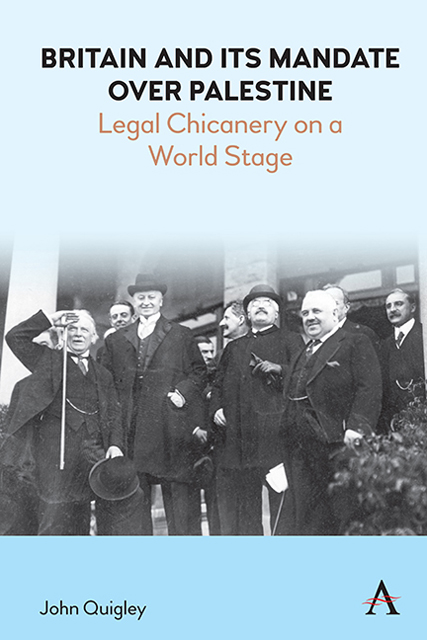Book contents
- Frontmatter
- Contents
- Preface
- Setting the Stage: Was Britain’s Rule in Palestine Legal?
- 1 The Balfour Declaration Is the Focal Point for the Legal Situation of Palestine
- 2 The Balfour Declaration Was a Binding Commitment to the Jewish People
- 3 The Jewish National Home Meant a Jewish State
- 4 The Balfour Declaration Was Issued to Affirm Jewish Rights in Palestine
- 5 The Paris Peace Conference Raised Jewish Statehood to the International Level
- 6 Britain’s Allies Made the Balfour Declaration an International Commitment
- 7 Britain’s Allies Endorsed Jewish Rights
- 8 Britain Took on Palestine Because of the League’s Mandate System
- 9 The League of Nations Protected Palestine’s Arab Population
- 10 Britain Was Given Palestine by the League of Nations
- 11 The League of Nations Put the Palestine Mandate into Legal Force
- 12 The Peace Treaty with Turkey Legalized Britain’s Status in Palestine
- 13 The Palestine Mandate Document Was a Treaty between Britain and the League
- 14 The League of Nations Required Britain to Implement the Balfour Declaration
- 15 The Palestine Mandate Document Implemented the League Covenant
- 16 The Palestine Mandate Document Recognized Jews as a National Group
- 17 The Palestine Mandate Document Bound Britain to the Balfour Declaration
- 18 The International Community Committed Itself to the Balfour Declaration
- 19 Britain Held Legal Status in Palestine
- 20 The United Nations Charter Carried Forward a Jewish Entitlement to Statehood
- Postscript: Why History Matters
- Documents Annex
- Notes
- Bibliography
- Index
4 - The Balfour Declaration Was Issued to Affirm Jewish Rights in Palestine
Published online by Cambridge University Press: 10 January 2023
- Frontmatter
- Contents
- Preface
- Setting the Stage: Was Britain’s Rule in Palestine Legal?
- 1 The Balfour Declaration Is the Focal Point for the Legal Situation of Palestine
- 2 The Balfour Declaration Was a Binding Commitment to the Jewish People
- 3 The Jewish National Home Meant a Jewish State
- 4 The Balfour Declaration Was Issued to Affirm Jewish Rights in Palestine
- 5 The Paris Peace Conference Raised Jewish Statehood to the International Level
- 6 Britain’s Allies Made the Balfour Declaration an International Commitment
- 7 Britain’s Allies Endorsed Jewish Rights
- 8 Britain Took on Palestine Because of the League’s Mandate System
- 9 The League of Nations Protected Palestine’s Arab Population
- 10 Britain Was Given Palestine by the League of Nations
- 11 The League of Nations Put the Palestine Mandate into Legal Force
- 12 The Peace Treaty with Turkey Legalized Britain’s Status in Palestine
- 13 The Palestine Mandate Document Was a Treaty between Britain and the League
- 14 The League of Nations Required Britain to Implement the Balfour Declaration
- 15 The Palestine Mandate Document Implemented the League Covenant
- 16 The Palestine Mandate Document Recognized Jews as a National Group
- 17 The Palestine Mandate Document Bound Britain to the Balfour Declaration
- 18 The International Community Committed Itself to the Balfour Declaration
- 19 Britain Held Legal Status in Palestine
- 20 The United Nations Charter Carried Forward a Jewish Entitlement to Statehood
- Postscript: Why History Matters
- Documents Annex
- Notes
- Bibliography
- Index
Summary
In 2017, a celebratory event was held in London for the centenary of the Balfour Declaration. Prime Minister Theresa May lauded Balfour. “Lord Balfour,” she said, “had the vision and the leadership to make this profound statement about restoring a persecuted people to a safe and secure homeland.” As we have seen, of course, it was not Balfour who made the statement. He had a hand in the drafting, but it was the War Cabinet's statement. The aim, May was suggesting in any event, was to protect Jewry. That effort was the more remarkable, she said, because the Government had other matters on its mind. “With Britain still embroiled in the midst of the First World War, the idea of establishing a homeland for the Jewish people would have seemed a distant dream for many.”
If the Balfour Declaration was issued to assert Jewish rights, it potentially could serve as a basis for such rights. If the Balfour Declaration was issued for other reasons, then it may not provide such a basis. The 1948 declaration of Jewish statehood, as we just saw, referred to a Jewish right in Palestine and asserted that such a right “was recognized in the Balfour Declaration of the 2nd November, 1917.” So the Balfour Declaration was taken by the statehood declarants as a rights-affirming document, issued on the premise that the Jewish people had a legal right to territory in Palestine.
The War Cabinet's statement, however, was not framed in the language of rights. It recited that the War Cabinet “favoured” a Jewish national home, but without saying why. The English Zionist Federation had lobbied for rights-affirming language. One draft it proposed referred to “the right of the Jewish people to build up its national life in Palestine.” The War Cabinet avoided such phrasing. The Balfour Declaration as issued contains no hint of legal right. The historical record shows that the War Cabinet issued it not to proclaim Jewish rights, but to promote the War effort.
May said that the statement was issued despite Britain's involvement in the War. May got it wrong. The statement was issued precisely because of the War.
- Type
- Chapter
- Information
- Britain and its Mandate over PalestineLegal Chicanery on a World Stage, pp. 23 - 28Publisher: Anthem PressPrint publication year: 2022

